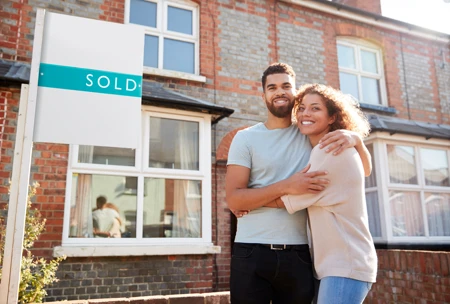How to spend less money
If you’re saving for a first-time buyer deposit, you’ll want to cut your outgoings as much as possible and save every penny you can. So go through your finances, look at where your money is going and see where you can cut back. For example:
• Consider your daily habits: Do you buy a coffee on the way to work every morning? A couple of pounds a time might not seem much, but it really adds up over the months. So take your own coffee from home in a travel mug instead.
• Spend less on food: Meal planning and batch cooking are great ways to save money on groceries. And ditch expensive takeaways too.
• Can you live rent-free? Rent is likely to be your biggest expense. Could you move in with family in the short term to save money? It could have an enormous impact on how quickly you can save your mortgage deposit, especially if they won’t charge you
Next, work out a plan of how much you can afford to save each month and set up a standing order to put it into your savings account on pay day.
Make extra money
If you’re wondering about the best ways to save for a mortgage, one way of making it easier to achieve is to increase the amount you earn. This could involve taking on an extra job in the evenings or weekends, making money online, for example by filling in paid surveys, or you could make some money by selling any belongings you don’t use anymore. Just remember you may need to tell HMRC about any extra income you have coming in.
Supercharge your savings
Give your first time buyer deposit a major boost by opening a Lifetime ISA. These can be taken out if you’re aged between 18-39 years old and are buying a first property or for your retirement. You can deposit up to a maximum of £4,000 a year until you’re 50. And you’ll get a 25% bonus on your savings, up to a maximum of £1,000 a year.
Find out how much you’ll need
Use a mortgage deposit calculator to find out how much you’re likely to be able to borrow. But don’t assume you’ll need a huge first time buyer deposit to get on the property ladder. This is because there are various options available for people with a small deposit:
- Help to Buy Equity Loan Scheme*With this first time buyer government scheme, the government will lend you up to 20% of the cost of your new build home. Or up to 40% if the property is in London. This is the ‘equity loan’. You’ll contribute a minimum of 5% of the purchase price and you’ll get a specialist Help to Buy mortgage product to cover the remaining amount. The equity loan is interest-free for the first five years, and you don’t need to make any repayments during this time. But bear in mind regional price caps apply on the value of property you can buy through the scheme, up to a maximum of £600,000 in London.
* There are different Help to Buy Equity Loan schemes for England, Greater London, Wales and Scotland. This information relates to England and Greater London only.
2. Shared ownership
With shared ownership, you buy a share of between 25%-75% of a house or flat and rent the remaining share. And because you’ll be buying a smaller percentage of the house, you’ll be taking out a smaller mortgage. This in turn means you’ll need a smaller deposit. Shared ownership schemes are usually available on either new build houses or resales from current shared ownership homeowners.
3. 95% Mortgages
And you may be able to get a mortgage with a 5% deposit thanks to the government’s mortgage guarantee scheme which was introduced to incentivise lenders to reintroduce 95% mortgage deals. You can use the scheme to purchase properties up to £600,00 and it’s open to all homebuyers and on all types of properties, not just new builds.
4. First Homes Scheme
This first time buyer government scheme aims to provide local first time buyers with at least a 30% discount on new build homes compared to the market price. The same percentage discount will be passed onto future first time buyers, so homes sold in this scheme will always be sold below market value. There’s a limited number of properties available right now through the First Homes Scheme but if you do use it, it means you’ll need a smaller deposit.
Fees when buying a house
When you’re saving up to buy a house, remember it’s not just your mortgage deposit you’ll need to have money for. There are other costs including a survey, legal fees and stamp duty, depending on the value of the property. So make sure you factor these in too.
Get advice about first time buyer mortgage rates
And once you’ve saved your first time buyer mortgage deposit, you still need to be savvy with your money. Because you’ll want to make sure you’re getting the right mortgage for your needs so that you’re not paying over the odds.
So if you’re a first time buyer and want to discuss your first time buyer mortgage options, speak to our award-winning team of expert advisers for a no obligation chat or give us a call on 028 6632 7116.

